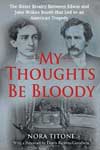My Thoughts Be Bloody: The Bitter Rivalry Between Edwin and John Wilkes Booth That Led to an American Tragedy
by Nora Titone
Free Press, 2010, $30
 This new book by first-time author Nora Titone is so intrepidly original in its research and interpretations that intense arguments and heated debates are certain to accompany its inevitable success. Titone redefines the character of John Wilkes Booth and his motivations for assassinating Abraham Lincoln. She also shines a long-neglected light on the fascinating life and achievements of acclaimed Shakespearean actor Edwin Booth, the assassin’s older brother, who has been wrongly eclipsed from history and from his brother’s story.
This new book by first-time author Nora Titone is so intrepidly original in its research and interpretations that intense arguments and heated debates are certain to accompany its inevitable success. Titone redefines the character of John Wilkes Booth and his motivations for assassinating Abraham Lincoln. She also shines a long-neglected light on the fascinating life and achievements of acclaimed Shakespearean actor Edwin Booth, the assassin’s older brother, who has been wrongly eclipsed from history and from his brother’s story.
My Thoughts Be Bloody is a Booth family saga rather than an examination of the Lincoln assassination. As Titone has said, “The aim of the book is to add a new dimension to a familiar perspective on John Wilkes Booth by showing that the Booth clan’s wildly varying fortunes in the U.S.—especially Edwin’s unprecedented career—were not irrelevant to the course of John Wilkes’s life.”
The book begins with a look at patriarch Junius Brutus Booth, the greatest Shakespearean actor of his generation, and his astounding personal and professional lives. She chronicles all 10 of his children by his mistress Mary Ann Booth, but especially Edwin and John: their relationship, their rivalry and their acting careers. While Edwin became his father’s traveling companion, theatrical assistant and chosen heir for the stage, John was left at home with his mother and sisters and given no training or encouragement as a thespian. As Edwin’s success as an actor grows to unmatched heights, the reader sees John’s untrained, undisciplined and unimpressive attempts to follow in the footsteps of his father and brother.
Titone’s excellent narrative style, above all, shows the Booths as human. Edwin comes alive as a miserable child, heir to an eccentric alcoholic, with a large talent suffused with vanity, ambition, selfishness and even ruthlessness. John wallows in resentment, entitlement and a surprising lack of acting talent that all fuel his unrealistic ambition to equal and ultimately surpass his more famous sibling.
As the rivalry between Edwin and John takes shape, we see not only how but also why they became such different men. And it is in this that the audacity and originality of this book reveals itself. While Titone does not explicitly declaim motives for John Wilkes Booth’s ultimate mad act, she clearly intimates that the murder of the president was motivated more by fraternal antagonism than by politics. He wanted to outshine and spite his more-famous and Union-loving brother—and to kill the president he so loathed and blamed for the South’s loss was the perfect way to achieve both his personal and political goals.
My Thoughts Be Bloody is an impressively researched and smoothly written narrative that demands a reassessment of the Booths as a family and as individuals. It will become essential reading on the Booth family and the Lincoln assassination.




